SCHLOCKTOBER ’23:This month I am playing some games with horror elements and blogging about them to determine whether they’re nasty tricks or delectable treats.

Okage: Shadow King is a game I’ve known about since it released in the US in 2001. I remember seeing reviews for it online and in magazines and I believe I even picked up a real PS2 copy at some point when I found it in a bargain bin, though I never got around to playing it. I then picked up a digital copy on PS4 for $7 in 2016. Every October since I have thought about whether this would be the year I played Okage. The reason I thought that in October was that I was convinced that it would be a good spooky season game. The premise (boy becomes enslaved by an evil king who possesses his shadow) sounded spooky. The soundtrack, which I’d heard snippets from, had spooky tracks on it. The cover most certainly looked spooky, like something lifted from a rejected poster for The Nightmare Before Christmas. I didn’t think it would be a scary game and I knew it was comedic but I thought it would have spooky themes, the same as something like Medievil, a game that is also comedic and not scary but is full of skeletons and ghosts and shadow demons that go bump in the night.
This is why I decided to play Okage as part of my Schlocktober series and it was only once I was at least 5 hours in and pretty much committed that I realized that Okage is not a spooky game at all, it’s just a schlocky comedy game from the early PS2 era.
In Okage you play a boy in a small village with a vaguely medieval level of technology but a modern social structure and bureaucracy. Your father, who has an interest in antiquities, brings home a strange bottle one day and the family opens it, unleashing a malevolent evil king who claims to be the reincarnation of the great evil king Gohma and is bent on restoring his rightful power and conquering the world. Unfortunately he is a shadow of his former self, both figuratively and literally, so he needs to recover his power before he can conquer the world. His name is Stan.
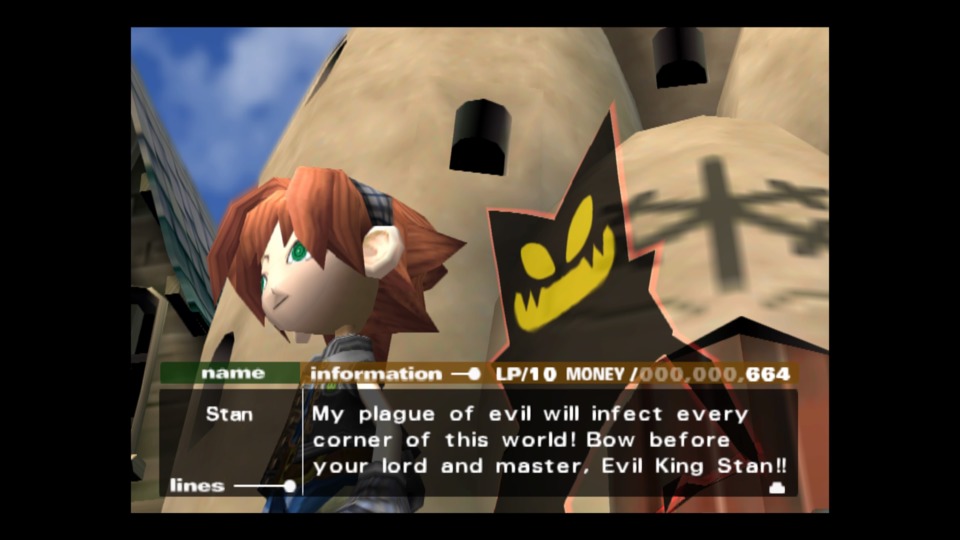
Stan immediately gets into shenanigans and puts your sister under the curse of pig latin. Because she’s worried about her romantic prospects with her cursed speech the family begs Stan to undo the curse and through a series of negotiations it is agreed that you will become his slave in exchange for his curing her. Everyone is quite cheerful about this except for you, and you don’t really get a say. This is a recurrent theme in Okage, which is one of relatively few JRPGs where you get to pick dialogue choices for your character, which in this case pretty much all result in everyone ignoring what you say and doing what they already wanted to do. So your character becomes Stan’s slave, Stan becomes your sentient shadow, and the two of you set off to destroy a bunch of rival Evil Kings who are popping up around the land and whose power Stan seeks to make his own.
If there’s one truly positive aspect to Okage it would have to be the characters and writing. Okage is mostly not a hilarious game, but it is consistently amusing, with wacky characters unlike almost any in games that have come to the West. Stan prides himself on being evil, but he’s mostly just a rude jerk and other characters find him hilarious, much to his chagrin. The only person who truly dislikes him is Rosalyn, the second person to join your party, who fashions herself as a great hero, and who constantly bickers with Stan throughout the adventure. He uses a lot of misogynistic language about her appearance but a lot of it is extremely off-beat and juvenile, using what appear to be direct translations from Japanese that come off as more goofy than offensive. Stan’s spluttering rage that people don’t fear and obey him is a real highlight.
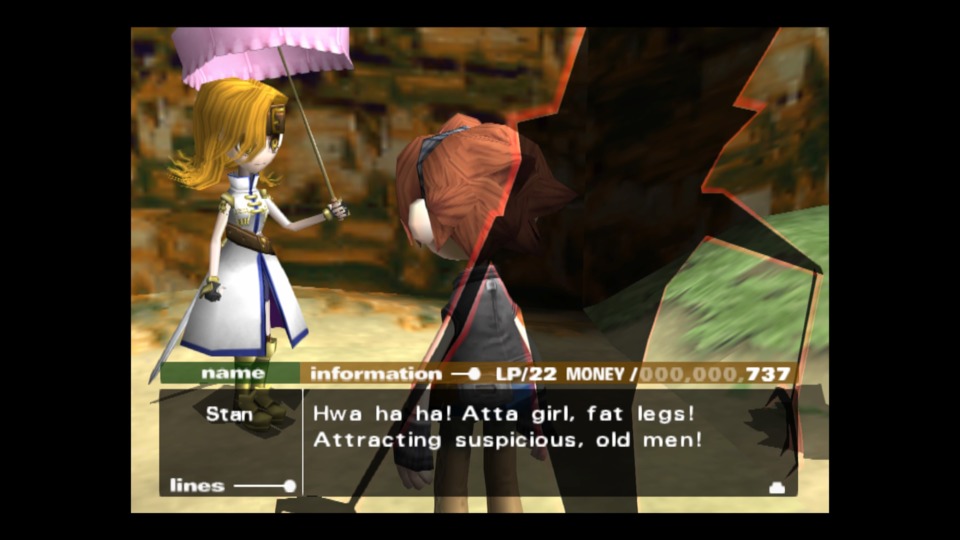
But it’s not just the main characters in Okage who are charming. Almost every random NPC has something at least interesting if not downright funny to say and none of them are bland and boring like so many RPG NPCs. Though a few of them will actually provide hints or advice, most just rattle on about their own lives, complaining about whatever mundane issues they’re dealing with or rambling on about how the train station needs to be cleaned. Sometimes they ramble on a bit too long for my tastes, but mostly I found them amusing and they gave the world a lot more character than if they’d just provided lore dumps. There’s something strangely immersive about coming across a guy who has been fired from a research center and complains that nothing he’s tried since has worked out and he feels cursed. He’s not there to explain the rules of the world or tell you where to go next, he’s just living his sad sack life and complaining about it.
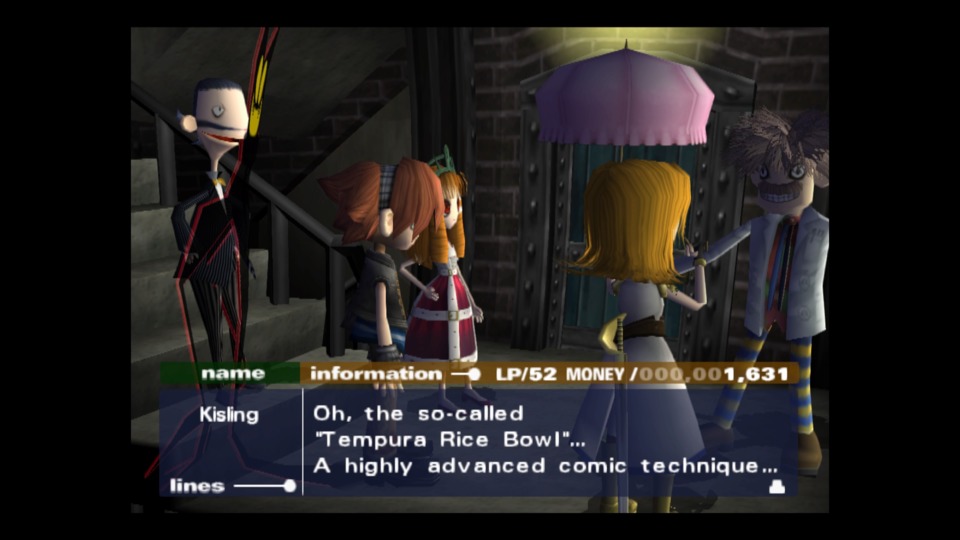
Speaking of complaining, that’s what I’m going to do about most of the rest of the game. The only other aspect of Okage that I’d call legitimately good is the music, which is not top tier RPG stuff but is above average, even in a genre known for its good music. Not every track is a winner but a lot of it is offbeat and very enjoyable.
Graphically Okage is below average even for an early PS2 title, though not abysmal. It has that “originally made for PS1 and then revamped for PS2” look that a lot of the earlier games did, and that was, in fact, its development cycle. Stan himself is a memorable creation, a grinning evil shadow who looms over the player character with leering yellow eyes. Everything else is generic JRPG, and while some of the towns have decent art direction the adventure fields and dungeons are as bare bones as possible. The fields are bland open areas with a few notable features like rivers and bridges but mostly just flat ugly ground. The dungeons are, with one exception, just a series of flat, rectangular, floors.
Gameplay wise each dungeon has a gimmick of some sort, such as entering glowing green switches to raise platforms to allow you to proceed, or having to pass through certain illusory walls. In every dungeon your ultimate goal is to defeat four magical urns (yes, urns!) per floor until you reach the boss. These urn battles vary slightly from dungeon to dungeon but they’re all basically the same, none of them are challenging, and there are dozens of them across the game’s 25ish hours. Urns are conceptually boring as enemies but that wouldn’t matter so much if the combat was good. It’s not. It’s the worst part of the game, which is not great for an RPG.
Okage’s combat seems, on the surface, like very standard JRPG fare. You have 3 active party members, pretty standard commands like attack, defend, use items etc… The game works on a Final Fantasy-like active time battle system where each of your characters has an action bar that charges over time and when it is fully charged you get to take a turn. There’s no visible time bar for enemies but they seem to have the same mechanics, and there are some abilities that can give you or your foes haste or slow effects. So far, pretty normal.
There are two major wrinkles that really hurt Okage’s combat. The first is that while there can be up to 10 enemies in the field at once there are a maximum of 3 “groups” of enemies. That means that you get a bunch of enemies (each of the same type since only enemies of the same kind can group together) lumped together as a group, and you can only target these groups, not individuals, but damage is tracked on an individual basis. This can be very frustrating, especially in boss fights. Almost every boss has a bunch of minions, and the winning strategy is to knock out the minions first and then take down the boss. However the minions are all grouped together so you can only attack the group and your characters will randomly select an individual enemy to attack, making it kind of a crapshoot as to whether you can actually winnow the numbers. There are a few attacks that target an entire group, but mana is pretty limited and the group attacks don’t do a lot of damage anyway.
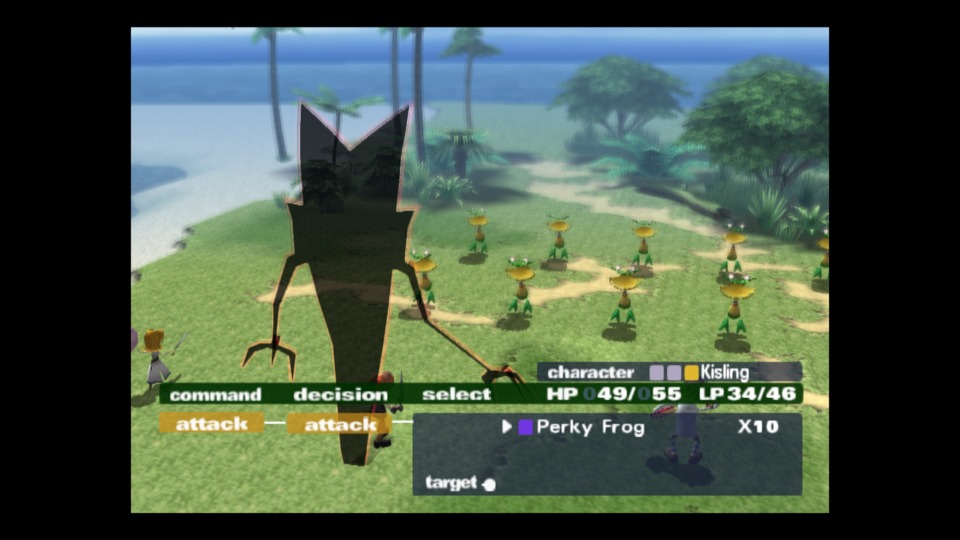
The group issue is annoying but not nearly as annoying as the second major issue, which is inconsistent timing. I mentioned that this is an active time battle system, so turn order can very a little, which is fine. What’s not fine is the seemingly random gap between when you enter a command and when it actually gets executed. Sometimes your character will immediately attack or cast a shield spell or whatever and sometimes a bunch of enemies and even your own characters for whom you entered commands later will act before she does. This can be a massive issue when it comes to healing. This is a JRPG where some enemies can do massive damage, able to take down your characters in 2 or 3 hits. That’s a legitimate design decision, but it’s made much less legitimate when enemies can sometimes sneak in multiple hits between when you enter a heal command and when it actually triggers. In practice it means you have to heal much earlier than you’d think because of this seemingly random delay, and sometimes redundantly heal just to keep your characters from going down. This is especially bad because, while your companions can be revived, if the main character goes down it’s a game over, reload from save. There were multiple times when my guy would take a hit, I would queue in a heal, and then the same enemies who had previously attacked would come back and smack me, killing me and ending my game. This is extremely frustrating. Most of the time enemies will spread out their attacks across your characters and you can sort of muddle through by healing consistently, but those times when the enemies would just decide to all attack my main guy and the heals just wouldn’t go off were extremely frustrating.
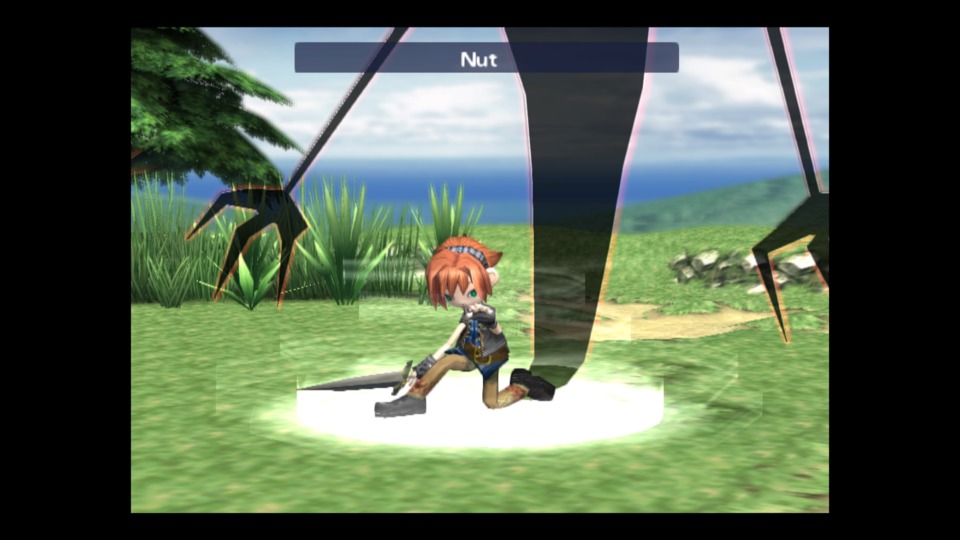
There are a bunch of other issues with the combat. For example many of your best skills are assigned to your main character. He’s your primary healer, which is frustrating because he’s also the guy you absolutely have to keep alive. He has a “provoke” skill that causes enemies to attack him instead of others, which is baffling because, again, if he goes down you get an instant game over, and it’s not like he’s your tankiest character anyway. Skills can require either mana or HP to cast, and he has some devastating attacks that hit every enemy but that drain an enormous amount of HP and so can never actually be used since you may not be able to heal him before he gets attacked after spending half his hp to cast. Like in many early JRPGs spells and special attacks have long and annoying animations that can slow combat to a crawl when enemies spam them. Offensive special moves can do a little extra damage when you follow the elemental system (only explained in the manual as far as I can tell, so I didn’t understand it until the game was almost over) but generally enemies are tanky and take forever to dispatch. The only glue holding the system together is that healing items are cheap so even though you have very little mana you can max out your inventory and keep spamming “big nuts” (this game’s version of potions) and survive. It’s a system that’s sometimes functional, sometimes broken, and never fun or empowering except on those rare occasions when you wipe a whole group out with one spell.
The progression and leveling system fares a little better even if it’s not exciting. You level every 1000 experience points, but you get fewer EXP from enemies who are weaker than you so it’s a pretty standard EXP curve in the end. Every level you gain some hp and possibly some attack or defense points or even a point of mana (much rarer than you’ think; you just do not get a lot of mana in this game and something like a revive spell can cost 1/4th of your supply, which is pooled.) Sometimes you’ll get a new skill. It’s fine for what it is but it’s very incremental and you never really feel the effects of a single level. The same is true for equipment, which tends to give a few points of attack or defend over the last iteration. It works but it’s not exciting.
The parts of Okage where you’re talking to people and following the bizarre story and charming characters are consistently entertaining, even if there are a few frustrating parts where it’s unclear what you’re supposed to do. The parts of Okage where you’re out exploring the world or doing dungeons are often a slog, except when you’re being driven by a desire to progress the plot or see the next character interaction. There are no random battles in Okage but instead ghosts will appear in the world and if they touch you a fight starts (once you’re in combat you mostly fight non-ghost enemies.) They can be avoided for awhile but as you take longer more and more appear and since they can pass through walls and box you into corners you will fight quite a bit (though weirdly interacting with any object in the world, like opening a chest or trying to open a locked door, despawns them all.) This is especially frustrating in two late game areas that are literal mazes and very annoying with the crappy camera.
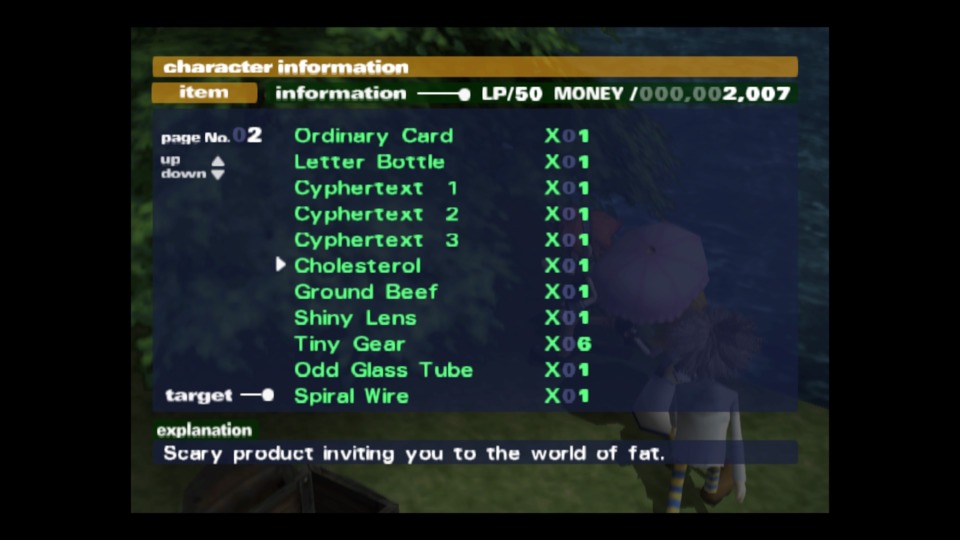
The final dungeon, one of these mazes, is one of the worst dungeons I have ever played, with obstructive walls that make it hard to see anything and swing so wildly they gave me a hint of motion sickness and ghosts that ambush you through walls. There’s also a special enemy who pops up randomly here called the bad poetry golem, who is not only tough but has a move called snatch 100000 where he steals 100000 “sukel” (the game’s currency) and runs away. Using silence on him won’t stop this, you just have to hope you can kill him before he does it, which may be literally impossible because it’s not like there’s a timer or countdown. If it does happen you basically have to revert to a save because that represents the cash from at least 20 battles, which can easily take 3-5 minutes each, meaning that he’s stealing an hour’s worth of cash. Your best strategy is just to flee from combat as soon as he pops up. Fun. Good game design. Much enjoyment.
To add insult to injury after I spent like 2 hours wandering around this horrible maze dungeon the final boss himself was one of the easiest in the game and poses no threat whatsoever as long as you keep spamming those big nuts.
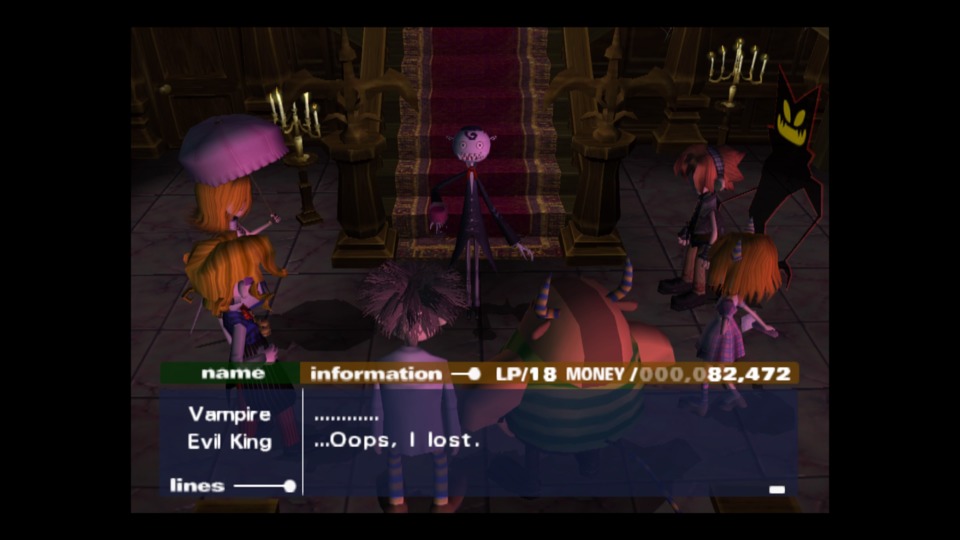
I played Okage because its cover and plot synopsis made it seem like a spooky game, which it definitely is not. Instead it’s a comedy/slice of life JRPG. It was clearly made on a modest budget based on the limited number of areas (there are five towns and four exploration zones) and recycled assets like all the stupid urns. It also feels like there are parts of the game that were cut during development; you get your last party member very near the end and he has basically no character development or purpose in the game whatsoever beyond his boring skillset, as far as I can tell. The combat is rough, the dungeons either frustrating (there’s one dungeon that causes like half of players to abandon the game because it’s so convoluted, based on trophy data) or stupidly simple, and the combat is boring with numerous frustration spikes.
Despite all this I kind of liked Okage, and it comes down to those characters and that writing. The direct translation of the Japanese is very clunky and there are typos and errors but it makes the game stand out as unique in a world where JRPGs can often feel like cookie cutter clones. That laid off research center worker whining about his bad luck is memorable to me in a way that so many other characters aren’t. Stan bickering with Rosalyn and calling her names was genuinely entertaining. I was constantly taking screenshots of good lines or moments. By the time the game ended I was more than ready to wrap things up, but at least it’s 25 hours and not 40. For me the charm was enough to carry my interest through to the end.
Okage is objectively the worst JRPG I have ever finished. To be fair I’ve probably finished less than 2 dozen JRPGs in my life and it’s not the worst I’ve ever started, but it lacks the mechanical or production qualities that make these games stand out. The story itself is nothing special, but the charming characters and dialog are enough to redeem it. I can’t say that I recommend Okage, but I can say that I have affection for it. It may have tricked me by appearing to be spooky, but at the end of the day it was kind of a treat.
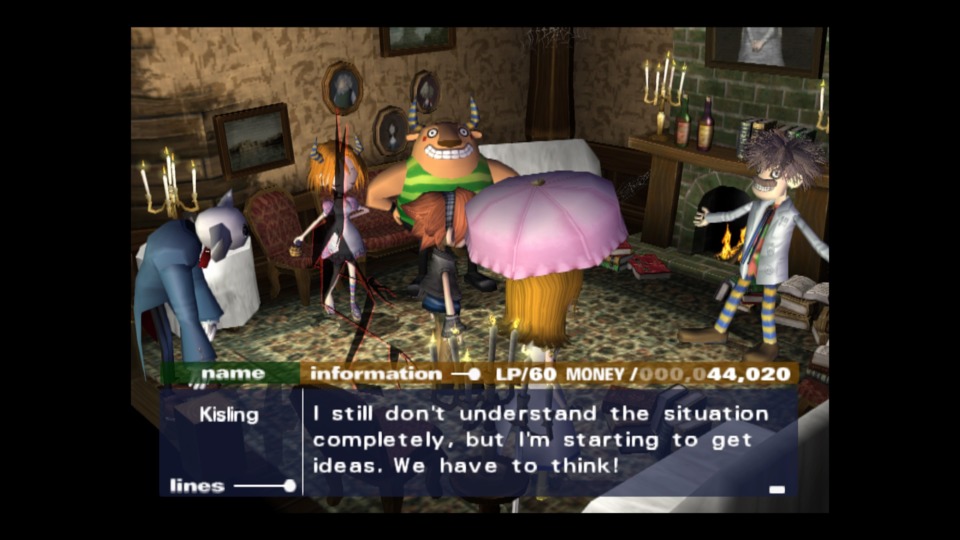
Schlocktober Rating: Novelty Schlock
Okage is like those jelly beans where half of them are delicious flavors like green apple or black cherry and half are disgusting flavors like boogers or licorice. Part of the experience is pleasant, part of it is unpleasant, but the strangeness of the experience makes it an interesting novelty. You wouldn’t want every bag of jellybeans to be like that, but if you only try it once it’s a fun time.
Log in to comment